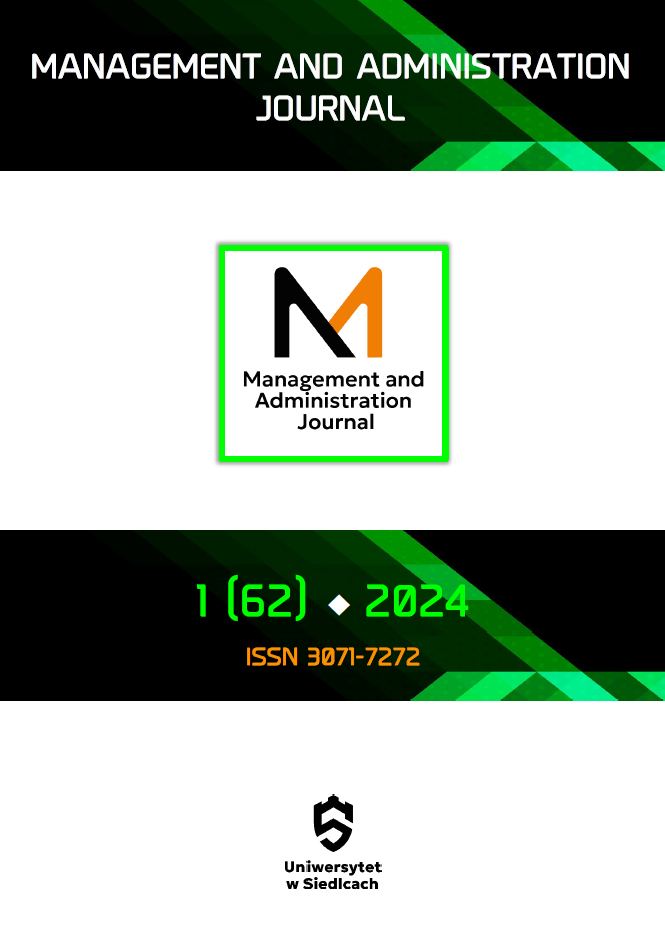ENERGY TRANSITION – THE CHALLENGES FOR POLAND VERSUS THE EXPERIENCE OF EU MEMBER STATES
DOI:
https://doi.org/10.34739/maj.2024.01.09Keywords:
renewable energy, energy production, clean energy, energy security, environmental impact of energy consumptionAbstract
Energy security is essential for Poland’s economy, society and sovereignty. Its essence is to provide continuous access to energy, the amount of which is sufficient to meet our country’s needs regardless of possible disruptions or threats. The consequences of the war that Russia started in 2022 have reached far beyond the borders of Ukraine. Energy prices all over Europe have significantly increased, thus clearly showing that much more green energy needs to be produced. Renewable energy sources, including wind energy, are playing an important and positive role in curbing the energy price rise, which would have been even stronger had it not been for wind energy. The purpose of the paper is to prepare a forecast on the energy production from renewable energy sources with the use of predictive models based on function approximation. Wind energy production is uncertain and depends, among others, on atmospheric factors, such as the wind power. The conditions for generating electric energy and the price of final energy may deepen the discrepancies between the social and economic development of countries and contribute to the polarisation of the world.
Downloads
References
Açar, T.S., Öz, N.A. (2020). The Determination of Optimal Cluster Number by Silhouette Index at Clustering of the European Union Member Countries and Candidate Turkey by Waste Indicators. Pamukkale Univ Muh Bilim Derg 26(3), p. 481-487.
Bajan, B., Łukasiewicz, J., Mrówczyńska-Kamińska, A. (2021). Energy Consumption and Its Structures in Food Production Systems of the Visegrad Group Countries Compared with Eu-15 Countries. Energies 14.
Belkin, P. (2008). The European Union’s energy security challenges. Connections 7(1).
Brodny, J., Tutak, M. (2020). Analyzing Similarities between the European Union Countries in Terms of the Structure and Volume of Energy Production from Renewable Energy Sources. Energies 13.
Bryden, I.G., Couch, S.J. (2006). ME1‒marine energy extraction: tidal resource analysis. Renewable Energy 31(2).
Chudy-Laskowska, K., Pisula, T. (2022). An Analysis of the Use of Energy from Conventional Fossil Fuels and Green Renewable Energy in the Context of the European Union’s Planned Energy Transformation. Energies 15.
Elmassah, S., Biltagy, M., Gamal, D. (2022). Framing the role of higher education in sustainable development: a case study analysis. International Journal of Sustainability in Higher Education 23(2).
Famulska, T., Kaczmarzyk, J., Grząba-Włoszek, M. (2022). Environmental Taxes in the Member States of the European Union –Trends in Energy Taxes. Energies 15.
Harrison, G.P., Wallace, A.R. (2005). Climate sensitivity of marine energy. Renewable Energy 30(12).
Kacperska, E., Łukasiewicz, K., Pietrzak, P. (2021). Use of Renewable Energy Sources in the European Union and the Visegrad Group Countries-Results of Cluster Analysis. Energies 14.
Kastanaki, E., Giannis, A. (2022). Energy decarbonisation in the European Union: Assessment of photovoltaic waste recycling potential. Energy 192, p. 1-13.
Khan, S.A.R., Ibrahim, R.L., Al-Amin, A.Q., Yu, Z. (2022). An Ideology of Sustainability under Technological Revolution: Striving towards Sustainable Development. Sustainability 14.
Larsson, J., Elofsson, A., Sterner, T., Åkerman, J. (2019). International and national climate policies for aviation: a review. Climate Policy 19(6).
Lowitzsch, J., Hoicka, C.E., van Tulder, F.J. (2020). Renewable Energy Communities under the 2019 European Clean Energy Package – Governance Model for the Energy Clusters of the Future? Renew. Sustain. Energy Rev. 122.
Martins, F., Felgueiras, C., Smitkova, M., Caetano, N. (2019). Analysis of Fossil Fuel Energy Consumption and Environmental Impacts in European Countries. Energies 12.
Mehrtash, M., Capitanescu, F., Heiselberg, P.K., Gibon, T., Bertrand, A. (2020). An Enhanced Optimal PV and Battery Sizing Model for Zero Energy Buildings Considering Environmental Impacts. IEEE Trans. Ind. Appl. 56.
Mendonça, M., Lacey, S., Hvelplund, F. (2009). Stability, participation and transparency in renewable energy policy: Lessons from Denmark and the United States. Policy and Society 27(4).
Ohlhorst, D. (2015). Germany’s energy transition policy between national targets and decentralized responsibilities. Journal of Integrative Environmental Sciences 12(4).
Ostasiewicz, S., Rusnak, Z., Siedlecka U. (2011). Statistics, Wrocław: WUE.
Oteman, M., Wiering, M., Helderman, J.K. (2014). The institutional space of community initiatives for renewable energy: a comparative case study of the Netherlands, Germany and Denmark. Energy, Sustainability and Society 4(1).
Publications Office of the EU (europa.eu).
Rakowska, J., Ozimek, I. (2021). Renewable energy attitudes and behaviour of local governments in Poland. Energies 14(10).
Rokicki, T. Perkowska, A. (2021). Diversity and Changes in the Energy Balance in EU Countries. Energies 14.
Safarzynska, K., van den Bergh, J.C. (2011). Industry Evolution, Rational Agents and the Transition to Sustainable Electricity Production. Energy Policy 39.
Salami, R., Kordi, M., Bolouri, P., Delangiz, N., Lajayer, B.A. (2011). Algae-Based Biorefinery as a Sustainable Renewable Resource. Sustain 1, p. 1349-1365.
Sinsel, S.R., Riemke, R.L., Hoffmann, V.H. (2020). Challenges and solution technologies for the integration of variable renewable energy sources ‒ a review. Energy 145.
Sovacool, B.K., Brown, M.A. (2010). Competing dimensions of energy security: an international perspective. Annual Review of Environment and Resources 35.
Stec, M., Grzebyk, M. (2022). Statistical Analysis of the Level of Development of Renewable Energy Sources in the Countries of the European Union. Energies 15.
Tyler, S., Beiter, P., Duffy, P. (2020, 2019). Cost of wind energy review. Golden, CO: National Renewable Energy Laboratory. NREL/TP-5000-78471.
Wolde-Rufael, Y., Weldemeskel, E.M. (2020). Environmental policy stringency, renewable energy consumption and CO2 emissions: Panel cointegration analysis for BRIICTS countries. Green Energy 17, p. 568-582.
www.eera-dtoc.eu/wp-content/uploads/files/D7-20-EERADTOC-final-summary-report-web-version.pdf [accessed 10.03.2023].
www.gov.pl/ Poland's energy policy until 2040.
www.statista.com/topics/6254/coronavirus-covid-19-impact-on-the-energy-industry.
www.statista.com/statistics/561888/global-daily-oil-demand-by-region-due-to-covid-19.
Zdonek, I., Tokarski, S., Mularczyk, A., Turek, M. (2022). Evaluation of the Program Subsidizing Prosumer Photovoltaic Sources in Poland. Energies 15.
Downloads
Published
Issue
Section
License
Copyright (c) 2024 Management and Administration Journal

This work is licensed under a Creative Commons Attribution-NonCommercial-NoDerivatives 4.0 International License.





